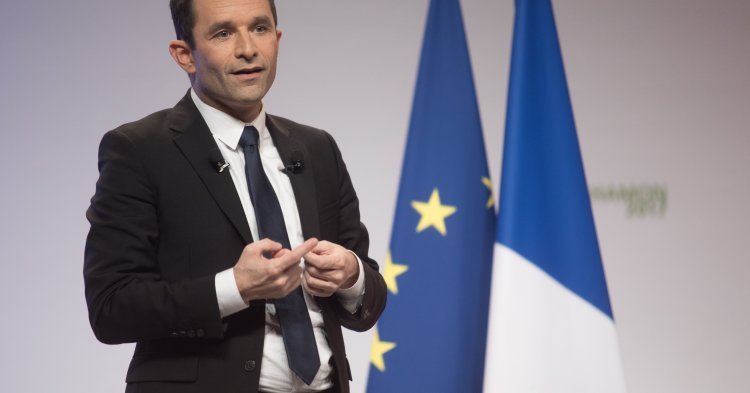A transpartisan list of citizens
On September 9, Benoît Hamon announced on the French radio RTL: “We have started to make a transnational list with other European political movements”. In saying this, he was referring to the European Spring, a coalition that the party recently joined, alongside left-wing parties from other European countries, such as the Polish party Razem and the Livre party in Portugal, as well as pan-European movements such as the democrat DIEM 25. Most of them, like Génération.s, are recently established parties and are not yet large enough political forces to hold seats in their national Parliaments.
The idea behind this? To not only campaign for the EU elections under a national label, but also to display a common agenda with other parties that transcends national borders. However, regarding the state of political forces of the Left in Europe, it will be rather difficult for the European Spring to form a political group in the European Parliament, as it requires a minimum of 25 MEPs from 7 countries.
In addition to the challenge of campaigning for the EU elections under a list which is independent from the eight groups already in the European Parliament, Génération.s chose to take up a second challenge: to campaign with a list made up of citizens willing to get involved but unknown to the public. Génération.s’ citizen list is intended to be a “gathering beyond the old parties’ borders”, like an alliance between “the left and the greens” that would not only encompass those who share the ideals of the left (vast programme), but one that would also primarily include fewer figures already established in the political game, in order to work towards a more accurate representation of France today. In order to guarantee this diversity, the one and only condition of becoming a candidate lies in sharing the commitments “of the left, the ecology, and of humanism”.
This is a particularly topical issue to Guillaume Balas, French MP and close to Benoît Hamon : “political systems, even those presented as the most open ones, are creating closed leagues. [...] Rather than relying on the potential of Génération.s’ members, it is about looking for people who can relate to a number of values but do not want to adhere to a political movement as such”.
Place publique
The list’s creation was announced simultaneously with the launch of Place publique, a joint initiative of journalists, writers and entrepreneurs, including essayist Raphaël Glucksmann. Along with Thomas Porcher, a heterodox economist critical of the prevailing liberal discourse, and Claire Nouvian, a documentary maker and president of the NGO Bloom advocating for the preservation of the marine environment and seabeds, he tried to set up a civilian and militant political movement, meant to be “the voice of the associations and citizens who get involved”. It shares numerous common features with Hamon’s citizen list. Indeed, it is described as a movement of citizens that is not only transpartisan but also left-wing and pro-European. It ultimately aims at gathering the “orphans of the Left”.
This raises a question surrounding how these two movements interact with each other, all the more so as Benoît Hamon did not rule out building bridges between the two initiatives. He further described Place publique as “people with whom we wish to discuss”, adding that it would be “irresponsible” to scatter as the two discourses are very similar. However, Place publique was not meant to become a list for the European elections. It was rather meant to be a citizen movement for gathering people and sharing ideas, like Nuit Debout in 2016, on which Génération.s could rely to find candidates for its list and elaborate on its propositions.
While other political parties have a hard time selecting their leaders for the European elections, the idea seems interesting
La République en Marche, les Républicains and le Parti Socialiste all seem to be experiencing difficulties finding a figure for the May election. This is likely due to or several reasons: European elections are often considered as a secondary election and only a few young newcomers and late-career politicians are sent to Brussels. On the pretext that the main issues are dealt with on a national scale and that few citizens actually care about decisions made by the European Parliament, despite the fact that 20% of national laws come from the EU.
Furthermore, party leaders tend to distrust the European elections, which are often seen as an event for contestation and expression of public discontent. This may be a result of the defeat of Michel Rocard in 1994, which led him to withdraw his candidacy for the presidential election. Finally, political parties often have a hard time finding common ground on European issues, which present the risks of tensions and cleavage. As a matter of fact, it is often complicated for them to find a figure to rally behind. This is particularly the case for the Socialist Party which is juggling between left-wing candidates highly critical of the EU and the European Commissioner Pierre Moscovici, known for his support for the EU.
Does Benoît Hamon’s citizens’ list truly have a chance?
It is not the first year when citizens lists have been set up for a European election. In 2014, Corinne Lepage launched the movement Europe citoyenne, which resulted in the constitution of eight lists for the election that covered all of French territory. Still, despite her being head of the list for the Ile-de-France region (where Paris is located), the movement failed to gain a single seat in the European Parliament.
In the same year, Nouvelle Donne, a young party founded by economist Pierre Larrouturou and emergency physician Patrick Pelloux, chronicler for Charlie Hebdo, presented seven lists; this encompassed all districts except for those Overseas. The heads of lists needed to be validated by a committee of drawn members in order to ensure that the process was as democratic as possible. Even if a party failed to obtain a seat in the Parliament, it still managed to reach the score of 2.9%, right below the campaign repayment threshold of 3%.
How is it that La République en Marche was able to succeed so shortly after its creation, while most ad hoc parties only saw marginal success and often dissolved? The answer likely lies in several causes. It could be because of what is at stake in the presidential election, a result of the gaping hole left between the Fillon case and the disappointment left by the Socialist presidency. However, it also lies in its leader, Emmanuel Macron, who managed to convince the French people; this is something Benoît Hamon will have to take into account.
According to Emmanuelle Reungoat, a lecturer at the University of Montpellier, “the leader’s personality is essential in the campaign management”. One thing is sure: Hamon knows that and he does not rule out including well-known personalities and to lead the list himself, as “he has a credibility that others do not have”.
The transnational and citizen strategy of Génération.s is not an isolated case, as the elections we are approaching are unprecedented given they are the first post-Brexit. In the context of proximity search with the people and of democratic promotion, another transnational movement was born in 2017: Volt Europa. Unlike the “European Spring”, however, Volt Europa is not a gathering of national parties, but a pan-European party trying to establish itself in a minimum of seven countries. The idea is then that the candidates of the movement campaign would not operate under the label of a national movement like Génération.s, but directly as part of a European movement. It now remains to be seen which strategy will be the most efficient… See you in May 2019!


Follow the comments: |
|
